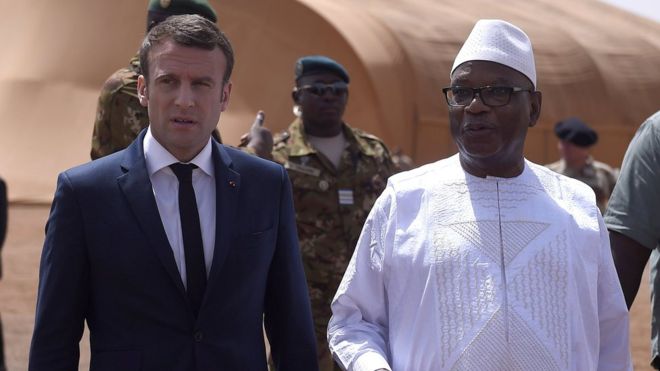President Emmanuel Macron arrived Friday in Mali for a visit to French troops battling Islamists and for talks with President Ibrahim Boubacar Keita on his first official trip outside Europe since taking power less than a week ago.
Macron said that France would be “uncompromising” in its fight against militant Islamists in Mali and the Sahel, vowing that France’s military operations would continue until the jihadists are eradicated.
“Operation Barkhane will only stop when there is no more Islamist terrorism in the region,” he said, adding that he discussed security matters with Algerian President Abdelaziz Bouteflika by telephone on Thursday.
The newly elected leader visited French troops serving there as part of France’s Operation Barkhane, an operation involving more than 4,000 French, UN and Malian troops in five Sahel nations. Macron promised during his campaign that, if elected, one of the first things he would do was visit French troops engaged in foreign operations. Less than a week after taking office, the new head of the army made good on his word.
Macron flew to Gao in northern Mali, where his predecessor François Hollande deployed the French army in 2013 with the goal of driving jihadists from the region. He was joined by members of his newly appointed cabinet, including Foreign Minister Jean-Yves Le Drian and Armed Services Minister Sylvie Goulard. The head of the French development agency (AFD), Remy Rioux, was also on the trip.
Standing alongside his Malian counterpart Ibrahim Boubacar Keita, Macron said he was determined to act for continued security in the region. He said he would also seek to strengthen cooperation with European nations, particularly Germany, in the fight against jihadists. Germany is the biggest contributor to the UN force in Mali, also known as MINUSMA, which has become the UN’s deadliest active peacekeeping operation. At least 19 French soldiers have died in the Sahel since 2013, the French ambassador to the United Nations said in April.

French President Emmanuel Macron, 2nd right, poses with soldiers as he visits the troops of Operation Barkhane, France’s largest overseas military operation, in Gao, northern Mali, Friday, May 19, 2017.
Tuareg separatists and Islamist groups linked to al-Qaeda, including Ansar Dine, seized most of northern Mali in early 2012. The jihadists were driven out of key towns by French-led forces the following year, but they continue to mount attacks on both civilians and troops in the north and center of the country. The government signed a peace and reconciliation agreement with Tuareg rebels and pro-government militias in 2015 aimed at isolating the jihadist groups.
Macron said on Friday that France would pressure the signatories to abide by the terms of the deal.
But more than four years after the launch of French military operations, the level of insecurity in Mali is “unprecedented”, according to the International Federation of Human Rights (FIDH). The operation now involves more than 3,500 French soldiers fighting in the West African nations of Mali, Niger, Chad, Burkina Faso and Mauritania, who serve alongside UN peacekeeping forces and the Malian army.
#Macron’s first non-Europe trip focuses on fighting #extremism https://t.co/4Sih9PQpub #twitter #mali pic.twitter.com/kl89cCW5Tx
— David Hulme (@DrDavidHulme) May 19, 2017
Worries over progress
While the operation had some early successes – most notably the liberation of Timbuktu and Gao, which had been occupied by rebels for a year – the strategy used to root out terrorists in this vast desert zone has lately been called into question. A report issued by the FIDH noted that two years after the peace accord, there are few signs of progress.
While the north of the country remains under government control, central Mali – long spared the jihadist menace – has now become the epicenter of the conflict. Rebel activity has spilled into northern Burkina Faso and into the area near the border with Niger.
In March, the three main jihadist groups in the region merged under the command of Ansar Dine leader Iyad Ag-Ghaly, calling the new group Nusrat al-Islam wal Muslimin.
“This development … demonstrated that these groups persist, recompose themselves and manage to set up means of coordination, despite the fight against terrorism that has been going on for several years,” the FIDH report said.
The FIDH also denounced a rise in “more and more sophisticated” attacks, mostly by terror groups. More than 332 people were killed in 385 attacks in 2016, including 207 civilians in the north and center of the country, the NGO said. The group denounced a resurgence in targeted killings, the resumption of hostilities between armed militias, and a rise in violent crime and sexual violence.
The report also cited human rights violations committed by Malian forces in their fight against terrorism, with the FIDH urging the Malian government to “take responsibility … [and] investigate and prosecute the perpetrators of such serious violations”.
The organization shared the chilling testimony of one victim beaten “for hours” by Malian soldiers: “They asked me if I was a jihadist and if I knew jihadists. I repeatedly answered no, that I was only looking for food for my family, but they didn’t listen to anything.”
Such extreme brutality on the part of soldiers is also counterproductive, the group said, as civilian cooperation can be critical in the fight against terrorism.
In some areas, the state’s absence has been exploited by terrorists. The Malian government has withdrawn from large areas of the country, leaving schools and health centers to close and limiting freedom of movement for civilians.
“Jihad doesn’t prosper randomly,” said Yvan Guichaoua, a lecturer in international conflict analysis at the University of Kent. “It emerges in the spaces where there is no form of legitimate government. Such spaces abound in Mali, where the government has relied on community militias to govern the north for many years.”
Macron warned on his visit that domestic political infighting should not weaken Mali’s resolve in the fight against the jihadists.

